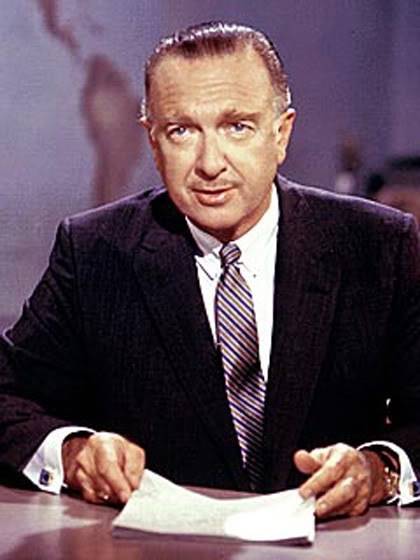
CBS News anchor Walter Cronkite, who died in 2009 at the age of 92, was known to television viewers as ‘The Most Trusted Man in America.’
HIRE ‘THE MOST TRUSTED
MAN IN AMERICA’?
Can the new network put focus
back on hard-news coverage?
ENTERTAINMENT PASSING FOR ‘NEWS’
By David Maril
The Al Jazeera America news network has been launched and we can only hope that it will do something television journalism has gotten away from — delivering factual, comprehensive and hardcore journalism.
It’s way too early however to evaluate what they are doing and where they are going. But on the plus side, they have hired a number of very solid, well-respected television journalists, like Adam May, former anchorman and reporter for Baltimore’s WJZ-TV.
If Al Jazeera America can succeed at providing in-depth, fair and professional news coverage, perhaps it will influence the other TV news outlets to cut back on the light, superficial features that have little relevance.
News professionals need to wrestle content control away from the entertainment influence that has taken over most of the national and local news coverage.
If Walter Cronkite were alive today and in his prime, he would be the perfect type of news anchorman for the new network to hire.
Cronkite, who died in 2009 at age 92, was recognized for his ethics, high journalistic standards and credibility. When he signed off each nightly newscast with, “And that’s the way it is,” millions of viewers believed him.
He was often cited as “the most trusted man in America.”
Unfortunately, one has to wonder if Cronkite would have been able to operate as a television newscaster today. With the TV news emphasis on style at the expense of substance, his background as a respected journalist in the field would probably hurt him more than help.
We are living in a fast-paced changing world as far as television news coverage goes. Audiences who want to be spoon-fed from the right tune in Fox News. Those who want their news coverage coming in from left field watch MSNBC.
DISTINCTION BETWEEN NEWS REPORTING AND COMMENTARY
Both of these cable networks thrive on erasing the distinction between news reporting and commentary.
CNN at one time prided itself for concentrating more on news and attracting viewers from a wide spectrum of political views. Lately however, with disappointing ratings, they have jumped on the crowded path of promoting personalities and controversy.
While cable news and Internet coverage has grown in popularity, regular network news broadcasts continue to diminish in influence.
Scott Pelley (CBS), Brian Williams (NBC) and Diane Sawyer (ABC) are not held in the same high esteem that was reserved for CBS’s Cronkite, NBC’s John Chancellor, and the legendary Chet Huntley and David Brinkley on NBC.
Except for Pelley, who presents a more traditional news-based presentation, the current crew, and their surrogates, resemble program hosts or performers more than trustworthy news anchors you can turn to for objective information and reassurance in a world crisis.
The Baltimore television market was one of the development grounds for this chatty, conversational approach to news with the popularity, from 1977-87, of the late Jerry Turner and Al Sanders. And the move away from formal, stiff, cardboard types of news anchors wasn’t a bad thing.
Turner and Sanders had credibility and news standards. The problem is that many other news departments took things a step further and shifted to lightweight content to go with the more personal format.
NEWS COVERAGE IS MUCH DIFFERENT NOWThe news coverage is much different now from what it was in Cronkite’s day. With cable news and the Internet throwing stories, sometimes unchecked, out so quickly to the public, often what isn’t a big story is treated like a major event.
It’s the copycat syndrome, with one news outlet running a ridiculous story and the others following as quickly as possible. Research, fact-checking, accuracy and keeping coverage in the right context and perspective are seldom priorities.
Ironically, CBS revealed how low its standards had dropped in its hour-long special devoted to Cronkite right after he died. In what can only be described as bad judgment and an insult to the hard-news standards Cronkite represented and upheld, the network used Robin Williams and George Clooney, a couple of Hollywood actors, as major voices on the tribute.
CBS didn’t even bother to include Bob Schieffer, a former anchor of the Evening News who had known Cronkite for years and had worked with him in the glory days of network coverage.
This shouldn’t however have come as such a surprise. When it comes to news, the emphasis even on the network of Edward R. Murrow and Cronkite has been too much flash and glitter.
It makes you wonder whether any network today would even recognize the talents of a young Walter Cronkite — who didn’t look like a celebrity movie star — if he were applying for a job.
Maybe if Al Jazeera America succeeds as a pure, hard-news-driven TV network, it will move television journalism back in a better direction.
Don’t, however, bet the house on this happening.
davidmaril@hermanmaril.com
“Inside Pitch” is a weekly opinion column written for Voice of Baltimore by David Maril.

Bob Schieffer restored credibility to CBS News when Dan Rather resigned as Evening News anchor in disgrace.
Schieffer was 68 at the time and took on the assignment for just one year until being succeeded in 2006 by Katie Couric, who had been co-anchor of NBC’s Today Show. Despite five years as CBS Evening News anchor Couric was never able to shake her lightweight image.
Even worse, in 2007 Couric offered a one-minute commentary on the importance of reading, which was substantially lifted from the Wall Street Journal. A CBS producer plagiarized the piece and Couric claimed the story — including her opening line, “I still remember when I got my first library card, browsing through the stacks for my favorite books” — was her own when it was not.
The producer was fired within hours of the Journal’s complaint to CBS. However the network kept Couric on as anchor for four more years without recrimination.
Still, the “deeper fakery of Couric’s plagiarism,” as noted by columnist Timothy Noah in a 2007 article for Slate, is that CBS regularly allowed not only Couric and Rather — but Walter Cronkite as well — to recite commentaries on the radio that were written by others and present them as their own.
CBS News stalwart Edward R. Murrow — who in Voice of Baltimore’s opinion was the greatest broadcast journalist ever — must still be turning somersaults in his grave.
CHECK OUT LAST WEEK’S “INSIDE PITCH” COLUMN: click here
…and read previous Dave Maril columns by clicking here.







September 27th, 2013 - 12:01 AM
[…] Charlotte, N.C. to Harrisburg, Pa. CHECK OUT LAST WEEK’S “INSIDE PITCH” COLUMN: click here …and read previous Dave Maril columns by clicking here. Filed under: Top Stories […]